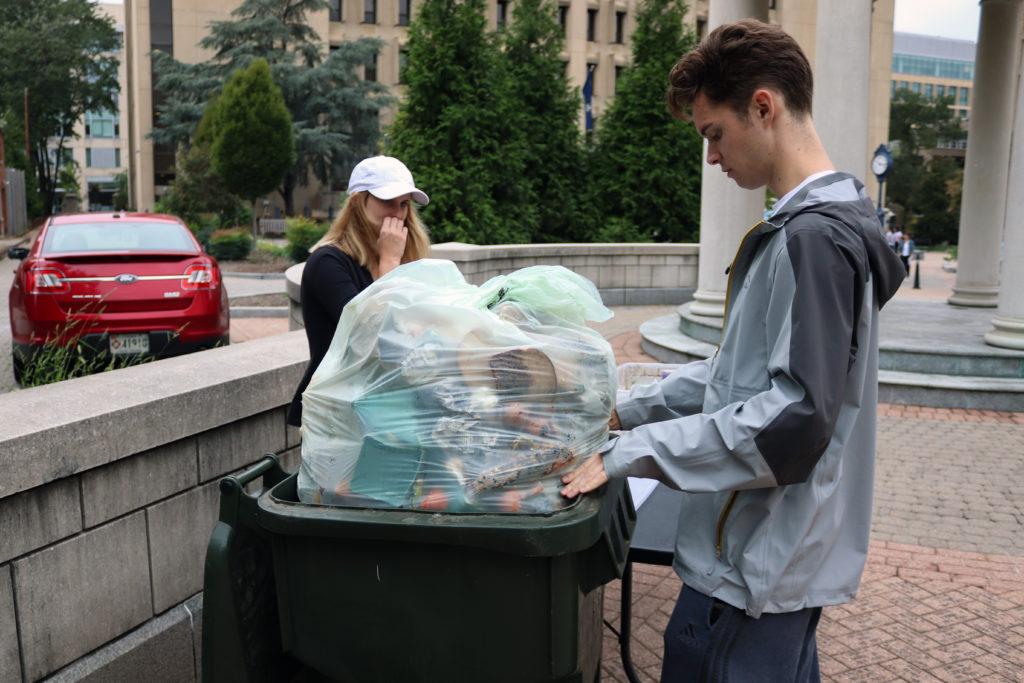Students will continue to collect food scraps in Kogan Plaza every week after a student-led composting program saw a successful pilot period last spring.
Colonial Composting now has a permanent home in the Office of Sustainability after a semester-long pilot as a partnership between the sustainable student organization Campaign GW, GW Zero Waste and the office. The program is now open two extra hours on Fridays, allowing dozens of students to drop off hundreds of pounds of food waste, students said.
Students involved in the program, which launched in February, said they have collected almost 500 pounds of food scraps since the start of this academic year – a more than 60 percent jump compared to the same point last semester.
Jonathan Kvilhaug, a sophomore intern for the Office of Sustainability who helps run the composting program, said that within the first three weeks of the semester, about 50 participants handed over food waste. He said that during the summer, the program’s volunteers collected 550 pounds worth of food scraps over 10 weeks with 20 regular participants.
Kvilhaug said the program currently has about five or six consistent volunteers who are in charge of collecting data for the program and sorting the food scraps for contamination, while 60 students are interested in donating.
“Not only do the volunteers help facilitate the program, but they end up being better educators for their peers and their friends,” he said.
Colonial Composting sends food waste to Maryland Environmental Service in Prince George’s County, where it is turned into Leafgro Gold, a composting mixture composed of food waste and yard scraps that can be used for planting in gardens and farms, officials said.
Kvilhaug said the biggest challenge for the composting program is garnering student awareness since the program is still in its early stages.
He said student volunteers are promoting the program through the Office of Sustainability’s email lists and the group hopes to gather more volunteers by partnering with other sustainability-focused student organizations, like Green GW. He said he is also working with residence advisers to explain to students what can be composted and where to take their food waste.
[gwh_image id=”1065966″ credit=”Lindsay Paulen | Staff Photographer ” align=”none” size=”embedded-img”]Volunteers sort compost material at Colonial Composting station in Kogan Plaza.[/gwh_image]
So far, the program has collaborated with RAs in Amsterdam and South halls, he said.
Kvilhaug said the extended hours have also encouraged more administrators and faculty members to participate in the program. He said at least four offices, including Undergraduate Advising for the Columbian College of Arts and Sciences, are participating in the program.
University spokesman Tim Pierce said the composting program relies on the support of student volunteers to run effectively, but the Office of Sustainability is committed to continuing the program as long as there is enough student interest.
“The Office of Sustainability is thrilled that the composting pilot program was so successful last year, and as such has decided to continue running it this semester as well,” Pierce said in an email.
Colin O’Brien, a junior who helped launch the pilot composting program last semester through Campaign GW, said the University’s Eco Reps – students who lead sustainable activities in their residence halls – assist their peers with signing up for the program or registering to volunteer.
“It’s a surprisingly simple and easy way to get your foot in the door into implementing more sustainable habits into your life,” O’Brien said.
Sydney Kleingartner, a freshman Eco Rep for Potomac House, said she was surprised by how easy it was to compost at the University, and that it was “satisfying” to compare the amount of food waste she brought to Kogan Plaza each week. She said in addition to food scraps – like banana peels or leftovers from Beefsteak – she composts non-food items, like a bowl from Sweetgreen or a pizza box from &pizza.
Kleingartner said that as an Eco Rep, she is working to educate students by talking to people living in her residence hall about how to compost at GW.
“I know that if I just keep telling people, more people will know about it, and there will be more people who have little Tupperwares in their freezer full of their food waste,” she said.
Jeanna Korzun, a freshman Eco Rep for Madison Hall, said she uses an empty Play-Doh container to collect her food scraps and keep them in her freezer. She said she wants to encourage students to take advantage of the composting program since it is free and centrally located on campus.
“It’s convenient – I can just run across the street,” she said. “You can just run there in between classes and go about your day.”




